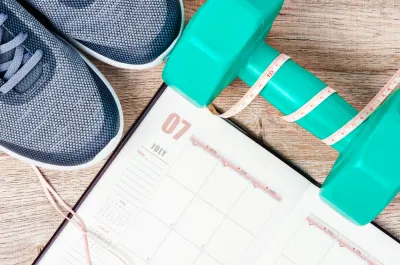What is 75 Day Hard Challenge? Gain Mental Toughness and Better Sleep
Ana Marie Schick: Resident Sleep Expert and Certified Health Coach • Jul 07, 2025

Key Takeaways
The 75 Hard Challenge focuses on discipline and consistency, but its structure can also impact sleep, recovery, and long-term sustainability.
- The 75 Hard Challenge is designed to build mental toughness through strict daily habits that test discipline, focus, and follow-through.
- Following structured routines and clean eating may support better sleep quality, especially when paired with a cool, stable sleep environment.
- The 75 Soft version offers a more flexible, lifestyle-friendly alternative that prioritizes consistency without extreme intensity.
- Daily requirements—such as two workouts, high water intake, reading, and avoiding alcohol—challenge both physical endurance and mental resilience.
The 75 Hard Challenge is a structured 75 day mental toughness program that includes strict rules around diet, exercise, hydration, and daily habits. While sleep is not an official requirement, it plays a major role in whether participants can complete the challenge safely and consistently.
Below, we’ll break down what the challenge involves, how it can sharpen your mindset, and why those tough 75 days might just lead to deeper, more restorative rest.
What is the 75 Hard Fitness Challenge?
The 75 Hard Challenge is a viral phenomenon that has flipped the script on personal discipline and the pursuit of physical fitness. Created by entrepreneur Andy Frisella in 2019, it is a rigorous 75-day program designed to enhance mental toughness, promote physical fitness and create a path to lasting lifestyle habits.
For 75 straight days, participants follow a no-excuses lifestyle plan built around five non-negotiable daily tasks. Think twice a day, a dialed-in nutrition plan, and zero room for shortcuts, cheats, or substitutions.
The commitment required far exceeds just a few days; miss even one item, and you’re not just slipping up, you’re starting over from Day One.
Crushing 75 Hard? Don’t Let Poor Sleep Slow You Down
Recovery is key to staying strong for all 75 days. The Chilipad helps optimize your sleep with personalized temperature control—so you can recharge faster, reduce night sweats, and wake up ready to dominate the next challenge.
The 75 Hard Challenge Rules
Ready to see what it really takes? Here’s a breakdown of the official 75 Hard Challenge rules:
1. Follow a Nutrition Plan
One of the core rules of the 75 Hard Challenge is sticking to a nutrition plan of your choice for the full 75 days. The catch? Once you pick it, you're locked in. There’s zero wiggle room, no cheat days, no “just one drink,” no excuses. The goal isn’t just clean eating; it’s unwavering discipline.
You can choose any diet that aligns with your health goals, lifestyle, or curiosity. A few popular healthy diet plans include:
- Mediterranean Diet: It's a well-rounded diet. Think fresh veggies, olive oil, fish, and the occasional glass of red wine. It’s all about heart-healthy fats, lean proteins, and a plant-forward mindset.
- Keto Diet: Low in carbs, high in fat, and designed to flip your body into fat-burning mode (a.k.a. ketosis).
- Vegan: No meat, no dairy, no eggs—not even honey or bone broth. It’s entirely plant-based, all the time.
- Flexitarian: Mostly plants with the freedom to enjoy meat here and there. It’s a flexible, balanced approach to eating—no hard rules, just smart choices.
- Paleo: The Stone Age diet that focuses on fruits, veggies, lean meats, nuts, and seeds. No dairy, grains, or processed foods allowed.
- Pegan: Blends the best of paleo and vegan eating—think 75% plants, 25% clean animal proteins like fish, eggs, and lean meats. It’s plant-first with room for nutrient-dense proteins.
- DASH: Short for Dietary Approaches to Stop Hypertension. This one’s all about reducing sodium, boosting potassium, and supporting a healthy heart.
- Whole30: An elimination-style diet that skips dairy, grains, and legumes while prioritizing whole foods like fresh fruits and veggies, eggs, lean proteins, healthy fats, and nuts.
No matter which path you choose, the real challenge is sticking with it. Switching plans halfway through? Nope. Slip up even once? You’re starting over. It’s not about chasing the “perfect” diet; it’s about showing yourself you can stay all-in, no exceptions.
Nutrition Plan Tip: For most people starting out, the Mediterranean diet is the best option. With its mix of lean meats, fresh veggies, healthy fats, and simple guidelines, it’s easier to stick with and doesn’t demand a complete meals. Balanced, flexible, and realistic. This diet is a great starting point that feels more like a lifestyle than a strict diet.
Your family will enjoy the meals too, making it easier to stick to.

2. Complete Two 45-Minute Workouts
Every day of the 75 Hard Challenge comes with a non-negotiable: two workouts, each 45 minutes long. One has to be outside, no matter the weather. Rain, snow, and a hot sun? You’re still out there. It’s all about building mental toughness and staying consistent, even when conditions aren’t ideal.
Doing two workouts a day might sound intense (because it is), but mixing things up helps prevent boredom and pushes your body to adapt in new ways. It’s not just about looking healthy; it’s about feeling tougher, stronger, and more capable of taking on the day.
That said, more isn’t always better. Moving your body every day is great for your heart, strength, and mood, but if you’re new to fitness, ease in smartly. Listen to your body, pace yourself, and focus on progress, not perfection.
It sounds simple—and honestly, pretty essential. You’ve got plenty of ways to move your body, so it never gets boring. Your twice-a-day workout options include:
- Cardio
- Swimming
- Cycling
- Running
- Yoga
- Pilates
- Jump Rope
- Strength Training Exercises
- High-Intensity Interval Training (HIIT)
3. Drink One Gallon of Water
Hydration might seem intense at a full gallon a day, but when you’re pushing your body through daily workouts, it’s not just important, it’s essential. This challenge drives home the point: water fuels everything from digestion and circulation to keeping your internal thermostat in check.
For context, the general daily recommendation is about 3.7 liters (125 oz) for men and 2.7 liters (91 oz) for women—so a gallon isn't as wild as it sounds when you're training hard.
Proper hydration doesn’t just keep your body running smoothly, it can also boost energy levels and give your skin that healthy glow. For many, this daily gallon becomes a wake-up call to stop sidelining water in everyday life.
Bonus: Staying well-hydrated can help curb cravings and support weight management by promoting a natural sense of fullness.
4. Read 10 Pages of Nonfiction
So, how does reading fit into a fitness challenge? Simple—because true transformation isn’t just physical. The 75 Hard Challenge builds mental muscle too, requiring participants to read at least 10 pages of a nonfiction book each day.
Whether it’s self-improvement, business, or educational topics, the goal is growth. This daily habit sharpens focus, fuels new perspectives, and reinforces the deep connection between mental and physical health.
Reading supercharges your brain, boosting cognitive function, sharpening focus, and reinforcing a growth mindset. By carving out time each day to read, participants aren’t just gaining knowledge, they’re building a habit of lifelong learning that pays off long after the challenge ends.
Keep in Mind: Audiobooks don’t count; you need to read with your eyes, not your ears.
Popular Books to Read During the Challenge
Not sure which book to crack open first? Here are some crowd-favorite picks that consistently pop up in 75 Hard forums and chat groups, each one geared to boost your mindset, discipline, and drive.
- Can’t Hurt Me" by David Goggins: A raw, relentless look at toughness from a man who redefined his limits—and then smashed through them. A 75 Hard must-read.
- "Atomic Habits" by James Clear: The go-to guide for building better habits, one small step at a time. This book is perfect for locking in the daily consistency the challenge demands.
- "Extreme Ownership" by Jocko Willink and Leif Babin: No excuses, just results. This Navy SEAL-inspired book teaches radical accountability, leadership, and the power of discipline.
- "Relentless" by Tim S. Grover: Written by the trainer behind legends like Michael Jordan and Kobe Bryant, this book dives deep into the unstoppable mindset of elite performers.
- "The 5 AM Club" by Robin Sharma: A blueprint for mastering your mornings and maximizing productivity, focus, all crucial tools for thriving during 75 Hard.
5. Take Daily Progress Pictures
The 75 Hard Challenge keeps you accountable with one simple daily task: snap a progress photo. It’s a visual check-in that helps you track physical transformation and achieve significant fitness improvements over time, staying dialed in on your transformation, no guesswork, just real results.
Focusing too much on appearance can lead to negative body image issues, so participants are encouraged to view the pictures as a reflection of their commitment and hard work rather than a sole measure of success.
Fans of the 75 Hard Challenge praise it for driving serious personal transformation, but health experts urge caution. Its all-or-nothing approach can pose risks, especially for those new to fitness or managing existing health conditions. It’s not a one-size-fits-all solution, and the intensity isn’t for everyone.

Benefits of the 75 Hard Challenge
Here’s what’s on the table when you go all in with the 75 Hard Challenge:
1. Mental Toughness
At its core, the 75 Hard Challenge is about training your mind as much as your body. For the average person thinking about giving it a shot, this means building serious mental resilience, learning to follow through even when it’s inconvenient or uncomfortable.
Many finish the challenge with a serious boost in confidence, stronger self-discipline, and a newfound sense of control. This all spills into all areas of life, from powering through deadlines at work to staying on top of everything at home.
2. Physical Health
Committing to two 45-minute workouts a day—one of them outside—gives your body a serious boost. It supports heart health, builds muscle, and improves overall fitness. Plus, regular exercise is a proven stress-buster and sleep enhancer.
In fact, research found that consistent physical activity can improve both the quality and duration of sleep, while also lowering the risk of chronic illness. [1]
Tip: Having an accountability workout partner can significantly increase your motivation and adherence to the 75 Hard Challenge, so find someone to help make the whole process more enjoyable who can keep you accountable as well!
3. Nutritional Discipline
Sticking to one solid diet—whether it’s Mediterranean, keto, vegan, paleo, or another from the list—without cheat meals trains you to make intentional, healthier food choices every day. This level of consistency can lead to weight loss, increased energy, improved mental health and overall health.
Below are some popular, highly rated apps to help you on your nutrition journey. In the end, if you can’t measure it, you can’t improve it.
- MyFitnessPal – This popular app helps users achieve their health goals by tracking food intake and physical activity, offering nutritional data, recipes, a community for support, and integrations with other fitness apps. Download it now to start tracking your nutrition.
- Lifesum – This fitness and health app focuses on helping users understand their nutritional needs and build healthy habits. It tracks food intake, exercise, and provides personalized feedback, meal plans, and recipes to support individual goals and dietary preferences.
- Cronometer – Particularly praised for its comprehensive nutrition tracking and detailed information on macronutrients and micronutrients, users of this app appreciate its accuracy, ease of use, and ability to integrate with wearable devices. Get the app and you’ll be surprised at how easy nutrition tracking can be.
4. Hydration
Staying hydrated comes with a long list of benefits and the daily gallon goal makes sure you don’t miss out. Proper hydration supports everything from energy levels and skin health to digestion and brain function. It can even improve your sleep quality.
Studies show that dehydration can disrupt sleep and reduce its overall effectiveness, making water one of the simplest, most powerful tools for feeling your best. [2]
Tracking a full gallon of water a day might feel a bit overwhelming at first, but the right tools can make it surprisingly simple. Here are some great apps and gadgets to help you stay on track and hit your hydration goals without overthinking it.
Just search for them in your app store to get started.
- MyFitnessPal – This app does more than track your meals, it helps you log your daily water intake and sends gentle reminders to keep you hydrated. You can download it and get to tracking now!
- Lose It! – Best known for tracking calories, but it also lets you log your daily water intake, helping you stay mindful and on target all day long. Get the app and start tracking your water.
- Hydro Coach – This app figures out exactly how much water you need each day and sends helpful reminders to keep you sipping consistently.
- Waterllama – With its clean design, playful interface, and built-in habit tools, this hydration tracker makes it easy and motivating to stay on top of your water goals. Download the app and give it a try.
5. Reading for Growth
A fantastic way to boost your personal growth and sharpen your mind is to read just 10 pages of a nonfiction book every day. This simple habit can really fuel your development, enhance your focus, and even help you get better sleep at night.
6. Progress Tracking
Taking daily progress photos gives you a powerful visual snapshot of your transformation, because sometimes, pictures say more than the scale ever could. Seeing those subtle changes day by day can be incredibly motivating, reinforcing positive habits and keeping you focused on your goals. It’s proof of progress you can actually see, and that makes all the difference.
Tip: Make sure you keep those photos somewhere visible so you can see them every day, it’s a great way to stay motivated and focused on your goals.
The Impact of the 75 Hard Challenge on Sleep
Taking on the 75 Hard Challenge can have a big impact on your sleep, a crucial part of overall health and resilience. Here’s how this intense new workout routine might actually help you get better rest:
Regular Exercise
A key part of the 75 Hard Challenge is completing two workouts every day, which is great news for your sleep. Consistent physical activity has been shown to improve sleep quality across the board. According to the National Sleep Foundation, regular exercise helps people fall asleep faster and enjoy deeper, more restorative rest.
Daily movement also naturally boosts physical fatigue, making it easier to wind down at night. Plus, exercise supports a healthy circadian rhythm, helping your body stick to a consistent sleep-wake cycle, which is essential for quality sleep.
Tip: Research backs it: rest days aren’t optional—they’re essential for recovery and performance. Even the American Council on Exercise gives them a thumbs-up.
Stress Reduction
Stress and anxiety have a sneaky way of wrecking a good night’s sleep. But when you stick to a daily routine and carve out time for personal growth, like reading a bit of nonfiction, you can soon start to feel more grounded. It’s a simple habit, but over time, it can seriously help quiet your mind and make falling asleep a whole lot easier.
Lower stress levels can lead to improved sleep quality as the mind is less likely to race with worries when it’s time to rest.
Nutritional Discipline
What you eat doesn’t just show up on your waistline—it shows up in your sleep, too. That late-night sugar fix or sneaky 3 p.m. coffee might feel harmless, but they can throw your sleep schedule way off and make it harder for your body to wind down.
On the flip side, sticking to a healthy diet means you’re more likely to fuel up on the good stuff—like magnesium, tryptophan, and omega-3s—all of which help your body relax and recharge.
A well-balanced diet keeps key sleep hormones like melatonin and serotonin in check, so you’re sleeping soundly instead of wide awake at 2 a.m.
Hydration
Drinking a gallon of water daily, as required by the challenge, supports overall hydration, which is vital for bodily functions, including sleep. Proper hydration can prevent issues like dry mouth and headaches, which can disrupt sleep.
Timing matters. Drinking water right before bed can backfire. To avoid those 2 a.m. bathroom breaks, you should lower your water intake in the evening and hydrate earlier in the day.
Benefits of Eliminating Alcohol for Sleep
Eliminating alcohol for some has proven to improve their sleep quality. Alcohol can disrupt sleep cycles, leading to fragmented sleep and preventing deep, restorative sleep. By avoiding alcohol, individuals can experience more consistent sleep patterns, fall asleep faster, and spend more time in the deeper stages of sleep.
Establishing a Routine
The structured nature of the 75 Hard Challenge encourages participants to develop a consistent daily and bedtime routine. Creating a regular sleep schedule is just as important for improving sleep quality.
It's not easy, but consistently going to bed and waking up at the same time every day—yes, even on the weekends—is one of the most beneficial things you can do. This routine helps regulate your body's internal clock, making it much easier to fall asleep and wake up feeling refreshed.
Risks and Considerations
There’s no denying the 75 Hard Challenge can push you to level up—but it’s not one-size-fits-all. If you’ve got existing health conditions like high blood pressure or diabetes, it’s smart to check in with your doctor before diving in. The program’s intensity can take a toll if not handled wisely, leading to burnout, disrupted sleep, or even a loss of appetite.
Experts agree: while the habits it builds can be powerful, the challenge’s all-or-nothing mindset isn’t always sustainable. That’s where more balanced spin-offs like 75 Soft Challenge come in, focusing on consistency over perfection, with room for flexibility, recovery, and long-term well-being.
Tip: It’s important to consult your doctor or a health care professional before starting any strict regimen, including the 75 Hard Challenge and any other fitness program.
Final Thought
The 75 Hard Challenge has the potential to be a game changer, boosting mental resilience, physical health, and even sleep quality. But success depends on knowing your limits and putting your well-being first. Like any other diet or fitness program, it’s best to talk to your doctor or a health care professional before getting started, especially if you have any pre-existing health conditions.
A quick check-in can help ensure the challenge supports your goals without compromising your health. At its core, the challenge is a crash course in discipline, consistency, and personal growth. For those ready to commit, it is more than just a fitness trend; it is a full-on mindset shift.
Frequently Asked Questions About the 75 Hard Challenge
What Is the 75 Day Hard Challenge?
It’s a mental toughness program that combines fitness, discipline, and lifestyle changes. Think of it as a no-excuses boot camp for your brain and body.
Can the 75 Day Hard Challenge Help Improve My Sleep?
Absolutely. Consistent workouts, structured routines, and clean eating all support deeper, more restorative sleep over time—and with the Chilipad, you can take your recovery to the next level by dialing in the perfect sleep temperature every night.
How Does the Chilipad Help During the 75 Hard Challenge?
Recovery is everything, and sleep is the foundation. The Chilipad helps you:
- Cool your body down for better deep sleep
- Recover faster from tough workouts
- Stay consistent with your recovery routine
- Optimize temperature even when your willpower runs low
What Are the Rules of 75 Soft?
75 Soft is the more flexible sibling of 75 Hard—same grit, less grind. The rules are:
- Eat well and drink only on social occasions
- Work out for 45 minutes a day, four days a week
- Drink a gallon of water daily
- Read 10 pages of a non-fiction book every day
- Reflect or journal each night
What's the Difference Between Hard 75 and Soft 75 Challenge?
The 75 Hard Challenge is an all-in, no-excuses mental toughness program with strict daily tasks and zero flexibility—miss a day, and you start over.
In contrast, 75 Soft offers a more balanced, sustainable approach with room for real-life moments while still building discipline and healthy habits.
Can You Lose Weight on 75 Hard?
Yes—you can lose weight on 75 Hard, but here’s the catch: weight loss isn’t the actual goal of the program. 75 Hard is more about mental toughness and discipline than dropping pounds.
Peer-Reviewed Research References
-
Alnawwar, M. A., et al.
The Effect of Physical Activity on Sleep Quality and Sleep Disorder: A Systematic Review.
Cureus, 2023.
Study Type: Systematic Review
Key Finding: Concluded that regular physical activity is generally associated with improved sleep quality and reduced sleep disturbances across different populations and age groups.
View Study
Source URL: https://pmc.ncbi.nlm.nih.gov/articles/PMC10503965/
-
Aristotelous, P., et al.
Effects of Controlled Dehydration on Sleep Quality and Quantity: A Polysomnographic Study in Healthy Young Adults.
Journal of Sleep Research, 2019.
Study Type: Experimental Polysomnographic Study
Key Finding: Found that controlled dehydration negatively affected sleep continuity and reduced total sleep time, indicating hydration status may play a role in objective sleep quality.
View Study
Source URL: https://pubmed.ncbi.nlm.nih.gov/29411452/









